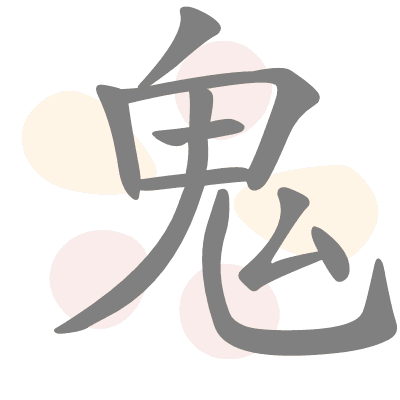鬼
鬼
n. ghost
| 80% | 120% |
Register to get less ads.
Registration is free and once you are registered you use this word in your private vocabulary lists.
Then you can train your own vocabulary either here or using one of our applications for PC, iOS or Android.
Registration is free and once you are registered you use this word in your private vocabulary lists.
Then you can train your own vocabulary either here or using one of our applications for PC, iOS or Android.
Other meanings
| char. person with bad habits; furtive, dishonest |
|
| n./adj. sinister plan or trick; terrible, tempest; (spoken) smart, clever (usually of children) |
|
| radical. ghost |
|
'鬼' is part of the following simplified words:
傀 嵬 巍 廆 愧 槐 櫆 瑰 磈 蒐 隗 鬼 魁 魂 魃 魄 魅 魆 魇 魈 魉 魍 魏 魑 魔
傀 嵬 巍 廆 愧 槐 櫆 瑰 磈 蒐 隗 鬼 魁 魂 魃 魄 魅 魆 魇 魈 魉 魍 魏 魑 魔
'鬼' is part of the following traditional words:
傀 塊 嵬 巍 廆 廳 愧 槐 櫆 瑰 磈 聽 蒐 醜 隗 鬼 魁 魂 魃 魄 魅 魆 魈 魍 魎 魏 魑 魔 魘
傀 塊 嵬 巍 廆 廳 愧 槐 櫆 瑰 磈 聽 蒐 醜 隗 鬼 魁 魂 魃 魄 魅 魆 魈 魍 魎 魏 魑 魔 魘
Simplified Chinese Traditional Chinese |
Simplified stroke orders are based on the 'Standard of National Commonly-used Mandarin Chinese Characters (现代汉语通用字笔顺规范)', issued by the China National Language and Character Working Committee (国家语言文字工作委员会) on April 7th 1997. Traditional stroke orders are based on information issued by the Taiwan Ministry of Education.
闹 鬧 v. be haunted |
丰 酆 phr. Fengdu ghost town (Chongqing, China) |
鬼 鬼 n. Halloween |
鬼 鬼 n. ghost |
孤 孤 nphr. ghosts, wandering souls; (metaphor) people living in a difficult situation, poor and miserable people |
装 裝 idiom. to pretend as ghosts to awe people; to mystify a matter to confuse others |
牛 牛 idiom. monsters and demons, forces of evil |
有 有 idiom. money makes the mare go, money talks |



